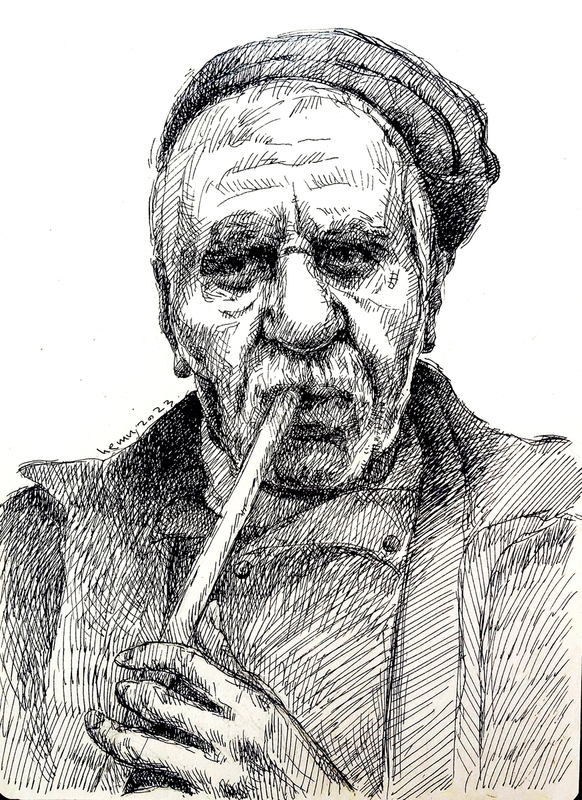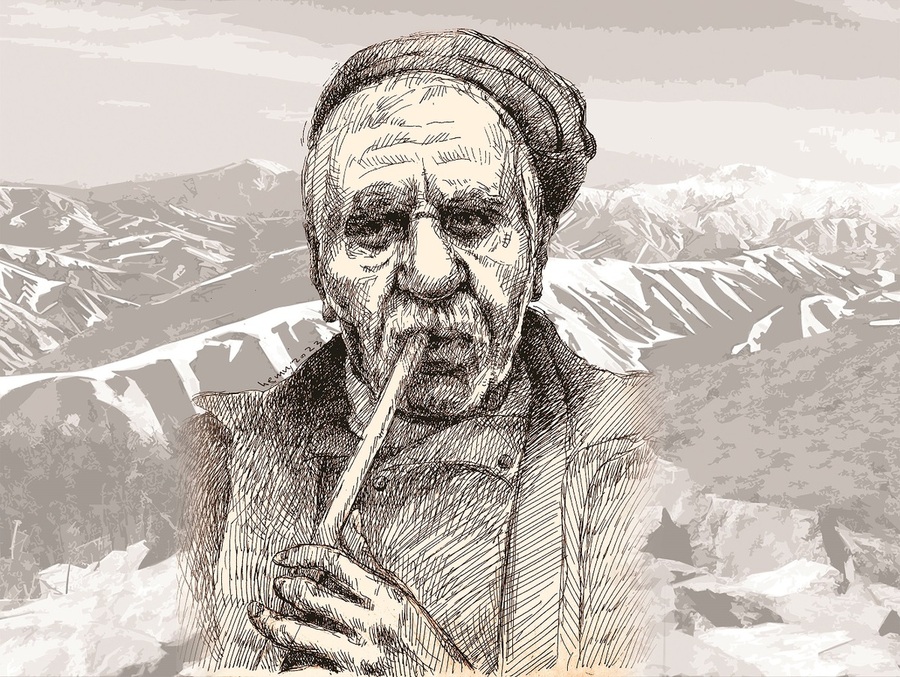There are a few Kurds who have not heard of Qala Mara; most people have heard the sound of the Shimshal of this great artist at least once in their lives.
Qala Mara was an illiterate and poor artist who was the only Kurdish artist on the street during his lifetime. Every evening he would sit with his Shimshal on the streets of Bokan and express his sorrows and pains as a suffering man with the passion of his Shimshal.
But that is not the whole definition of a great artist. Above all, Qala Mara's ability to play Shimshal was so high that the street artist was selected several times as a jury for wind instruments at Iran's highest music festivals. For example, he took on this task in several Iranian regional music festivals.
On the other hand, Qala Mara had an old relationship with all the original Kurdish folk music. It was this deep relationship that led him to play most of these songs on his only instrument, thus hitting two targets. First, he was able to save many of these songs from extinction, and those that were recorded gave the opportunity to later artists to revive these songs with the Shimshal.
The second effect was that if the Qala Mara's Shimshal could revive these songs, it could connect a generation of Kurdish people to a musical and aesthetic tradition and save them from being alienated from national art.

Character Designer: Hemn Qaremani
Music is one of the fields through which part of the identity of nations can be introduced and preserved. In the vast world of music, few nations have been able to leave their own mark on music, so that one can recognize it through music by hearing it and ignoring other characteristics of the nation. But there are nations whose music makes you feel part of their identity. For example, Indian, Arabic, and even Azerbaijani music have this characteristic. Indian music is recognized through the sound of the sitar, Arabic music through the rhythm and melody, and Azerbaijani music through the sound of the Azerbaijani Tar. The music of many other nations has its own rhythm in this way, and many nations have lost their music due to the wave of globalization, the mixture of cultures, and the adoption of music from other nations.
Kurdish music has its own identity for many reasons. That is, it has a number of characteristics that you cannot find in the music of any other nation. This uniqueness means a discriminatory identity, which is important for enriching national identity and making it special.
For example, in Kurdish music, the maqams of Allaweisi, Siachamana of Hawraman, Hora of Jaf, and tambourine are some of the characteristics that define its boundaries.
Another characteristic of Kurdish music is the playing of the Shimshal. This instrument, with its style, shape, and appearance, even if it exists among other nations, the sound that Kurdish Shimshal artists have created from this instrument is unique and there is not in the music of any other nation.
This instrument has a long history among the Kurds. The atmosphere of “Hawara Bara” and the names of people like Darwish Abdullah, whom Goran mentions in a poem as the only Shimshal player, and the relationship of every shepherd and villager with this instrument, prove the fact that the Shimshal has been played since ancient times. It was among the Kurds and the Kurdish people expressed their feelings and wishes through this simple instrument.
In the 20th century, the only Kurdish artist, Qala Mara, gave the instrument better prestige. If the sound of Shimshal was initially a symbol of the artist's personal concerns, it later became an artistic symbol and the survival of a nation. Even recently, they used it in Kurdish orchestras, and the sound that had been the heart of aestheticians and artists alone was now heard more widely along with other musical instruments. This work stems from the ability and creativity of the artist Qala Mara, who established a special style and school from a simple instrument such as the Shimshal without knowing the notes and methods of music, which currently has thousands of enthusiasts and students.
The great Kurdish artist was born in 1925 in the village of Kulija between Bokan and Mahabad. As he said he started playing Shimshal at the age of eleven. As we know, the Shimshal is a Kurdish musical instrument made of metal having six holes and looks like the Persian flute, but it is made of reeds.
Qala Mara's real name is Qader Abdullazadeh, but according to him, Sheikh Mohammad Khanaqa gave him the title Qala Mara because of his calm and gentle personality. Although his father and grandfather were Shimshal players, Qala Mara says he had no teacher and learned to play the Shimshal himself. He played at the Shiraz Art Festival during the reign of Mohammad Reza Shah Pahlavi. He also went to Sulaimani at the invitation of Iraqi President Jalal Talabani and recorded many of his songs. Qala Mara carried his shimshal in his pocket until the end of his life and wherever he went he expressed his feelings through it. He died in 2009 in Bokan and his body was buried in a mass ceremony attended by tens of thousands of people near the grave of the great Kurdish singer Hassan Zirak on the Nalashkena foothill.









